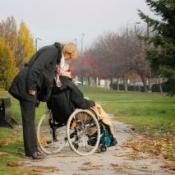Help! Caregiving for My Parent Is Making Me Resentful
Dear GoodTherapy.org,
After three years of caring for my terminally ill mother, I have just about had it. I uprooted my life to care for her—leaving my husband and giving up a great job in a city I loved—and there is still no end in sight. I love my mom very much, but this is not what I signed up for. I thought it would be a year or two at the most, but she is a tough old lady and she’s fighting the good fight. On the one hand, I am proud of her and this must mean I’m doing a pretty job of caregiving. On the other, I am starting to become resentful, which I feel incredibly guilty about.
I certainly don’t want my mom to die. I’m not going to stop giving her the best care she can get. But I am beyond burnt out, my life is on indefinite hold, and I’m lonely and broke. I have no life outside of caring for my mom. Basically, I am hating the universe right now. Please tell me I’m not crazy for feeling all this stuff. —Nothing Left to Give
Dear Nothing Left,
You are absolutely not crazy for feeling all this stuff. In fact, I’m amazed it took three years to get there! What you are describing is an untenable situation where you are being pulled by so many competing needs. Of course you want to care for your dying mother. Of course you resent leaving a job/city/husband you loved to do so.
Although I don’t know all the details of your circumstances, I wonder about the process that led to your decision to uproot everything to care for your mom. There are many levels of care we can offer loved ones who are struggling. You chose to put the relationship you have with your mother over all other relationships in your life—your professional ones, your partner one, and even the one with yourself—indefinitely. It is painful when our various roles come into conflict. Often, we have to temporarily shift more energy and time to one at the expense of the others, but it is not reasonable to imagine we can sustain ourselves when we neglect all the other parts of our lives. You cannot fill from an empty vessel, and it sounds as if, after three years, your vessel is pretty empty.
Often, we have to temporarily shift more energy and time to one at the expense of the others, but it is not reasonable to imagine we can sustain ourselves when we neglect all the other parts of our lives.
I wonder what options you have explored or what might be available to you. Can you attend to some of your mother’s caretaking needs without sacrificing all the other parts of your world? What sources of support might be available to you—even for respite care? I recommend finding a therapist near you to explore not only some of the options you might have, but also to process frustration and guilt you’ve been feeling. Many of the bereaved individuals I’ve worked with share a common experience of feeling a bit of relief after their loved one passed, or even having moments of wishing it was over so they could be relieved, and then feeling tremendous guilt about that. It’s natural to feel all of those things.
I wonder what conversations you’ve had with your mother about her needs and her expectations of you. Could she potentially identify ways in which you can shift how you are supporting her while still ensuring she gets the care she needs? Knowing she is stronger than everyone expected, it might be time to talk about altering the plans for a more indefinite timeline. I imagine she also has a complex set of feelings about watching you give up your life to care for her. She may want the same things you do. Perhaps together you can find ways for you to be involved in her care, but not to sacrifice your entire world indefinitely.
Best of luck,
Erika Myers, MS, MEd, LPC, NCC
Leave a Comment
By commenting you acknowledge acceptance of GoodTherapy.org's Terms and Conditions of Use.

 How to Care for Yourself While Caring for Others
How to Care for Yourself While Caring for Others  Compassion Fatigue: Can You Care Too Much?
Compassion Fatigue: Can You Care Too Much?  Helpless to Help: When Your Spouse or Partner Is Depressed
Helpless to Help: When Your Spouse or Partner Is Depressed